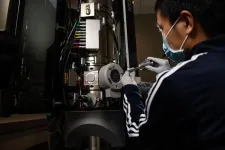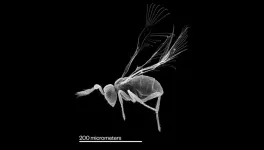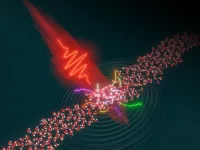(Press-News.org) A new study in JAMA Network Open may provide key answers to how to help people experiencing chronic back pain.
The study, published today, examined the critical connection between the brain and pain for treating chronic pain. Specifically, they looked at the importance of pain attributions, which are people’s beliefs about the underlying causes of their pain, to reduce chronic back pain severity.
“Millions of people are experiencing chronic pain and many haven’t found ways to help with the pain, making it clear that something is missing in the way we’re diagnosing and treating people,” said the study’s first author Yoni Ashar, PhD, assistant professor of internal medicine at the University of Colorado Anschutz Medical Campus.
Ashar and his team tested whether the reattribution of pain to mind or brain processes was associated with pain relief in pain reprocessing therapy (PRT), which teaches people to perceive pain signals sent to the brain as less threatening. Their goal was to better understand how people recovered from chronic back pain. The study revealed after PRT, patients reported reduced back pain intensity.
“Our study shows that discussing pain attributions with patients and helping them understand that pain is often ‘in the brain’ can help reduce it,” Ashar said.
To study the effects of pain attributions, they enrolled over 150 adults experiencing moderately severe chronic back pain in a randomized trial to receive PRT. They found two-thirds of people treated with PRT reported being pain-free or nearly so after treatment, compared to only 20% of placebo controls.
“This study is critically important because patients’ pain attributions are often inaccurate. We found that very few people believed their brains had anything to do with their pain. This can be unhelpful and hurtful when it comes to planning for recovery since pain attributions guide major treatment decisions, such as whether to get surgery or psychological treatment,” said Ashar.
Before PRT treatment, only 10% of participants’ attributions of PRT treatment were mind- or brain-related. However, after PRT, this increased to 51%. The study revealed that the more participants shifted to viewing their pain as due to mind or brain processes, the greater the reduction in chronic back pain intensity they reported.
“These results show that shifting perspectives about the brain’s role in chronic pain can allow patients to experience better results and outcomes,” Ashar adds.
Ashar says that one reason for this may be that when patients understand their pain as due to brain processes, they learn that there is nothing wrong with their body and that the pain is a ‘false alarm’ being generated by the brain that they don’t need to be afraid of.
The researchers hope this study will encourage providers to talk to their patients about the reasons behind their pain and discuss causes outside of biomedical ones.
“Often, discussions with patients focus on biomedical causes of pain. The role of the brain is rarely discussed,” said Ashar. “With this research, we want to provide patients as much relief as possible by exploring different treatments, including ones that address the brain drivers of chronic pain.”
About the University of Colorado Anschutz Medical Campus
The University of Colorado Anschutz Medical Campus is a world-class medical destination at the forefront of transformative science, medicine, education and patient care. The campus encompasses the University of Colorado health professional schools, more than 60 centers and institutes and two nationally ranked independent hospitals - UCHealth University of Colorado Hospital and Children's Hospital Colorado - that treat more than two million adult and pediatric patients each year. Innovative, interconnected and highly collaborative, the University of Colorado Anschutz Medical Campus delivers life-changing treatments, patient care and professional training and conducts world-renowned research fueled by over $690 million in research grants. For more information, visit www.cuanschutz.edu.
END
New study provides evidence for more effective brain-based treatment of chronic back pain
Two-thirds of participants reported being pain-free or nearly so after reattributing pain to mind or brain processes during recovery
2023-09-28
ELSE PRESS RELEASES FROM THIS DATE:
A new twist on rechargeable battery performance
2023-09-28
RICHLAND, Wash.—For decades, researchers have assumed that the inevitable filmy buildup on electrodes inside rechargeable batteries is the driver of performance loss. Now, we know that view is backward.
The buildup of mossy or tree-like structured lithium metal deposits on battery electrodes is not the root cause of performance loss, but rather a side effect. The first direct measurement of the electrical properties at the boundary between the solid electrode and the liquid electrolyte inside a rechargeable battery is reported today in Nature Energy.
The study, led by a research team at the Department of Energy’s Pacific Northwest National Laboratory, shows that the so-called ...
Pharmacist-led intervention can improve medication adherence among Latinos with type 2 diabetes
2023-09-28
UCLA-led research suggests that diabetes control can significantly improve for Latinos when a pharmacist implements an intervention that addresses these patients’ barriers to medication adherence.
In this pharmacist-led intervention, pharmacists reviewed the patients’ lab results, vital signs, and barriers to adherence. They then used this information to design a personally-tailored intervention to boost medication adherence and optimize the treatment regimen.
The study is the first to evaluate a collaboration between pharmacist and physicians aimed at improving diabetes care in a large healthcare system among Latino patients, said study lead Dr. Kimberly Narain, ...
Decoding the complexity of Alzheimer’s disease
2023-09-28
CAMBRIDGE, MA -- Alzheimer’s disease affects more than 6 million people in the United States, and there are very few FDA-approved treatments that can slow the progression of the disease.
In hopes of discovering new targets for potential Alzheimer’s treatments, MIT researchers have performed the broadest analysis yet of the genomic, epigenomic, and transcriptomic changes that occur in every cell type in the brains of Alzheimer’s patients.
Using more than 2 million cells from more than 400 postmortem brain samples, the researchers analyzed how gene expression is disrupted as Alzheimer’s progresses. They also tracked changes in ...
Accelerating sustainable semiconductors with ‘multielement ink’
2023-09-28
Key takeaways:
Scientists have developed “multielement ink” – the first “high-entropy” semiconductor that can be processed at low-temperature or room temperature.
Multielement ink could enable cost-effective and energy-efficient semiconductor manufacturing.
The new semiconducting material could accelerate the sustainable production of next-gen microelectronics, photovoltaics, solid state lighting, and display devices.
Semiconductors are the heart of almost every ...
Researchers create first-ever map of a single animal’s early visual system
2023-09-28
Neuroscientists at the Flatiron Institute in New York City and their colleagues have made a big breakthrough using one of the world’s smallest brains.
Using an ion beam, an electron microscope and a lot of patience, the neuroscientists mapped out the entire early visual system — from the eyes that take in light to the neurons processing the information — for a parasitic wasp smaller than a grain of table salt. The feat marks the first time scientists have fully reconstructed such a system at the synaptic level from a single specimen of any animal species, the neuroscientists report ...
Study reveals more depression in communities where people rarely left home during the COVID-19 pandemic
2023-09-28
Key Takeaways
In a survey-based study of US adults, those living in communities in which most people seldom left home at certain times during the COVID-19 pandemic were more likely to report symptoms of depression
The link remained strong even after considering COVID-19 activity, weather, and county-level economics
Accounting for state-level pandemic restrictions only modestly attenuated the association
BOSTON – Higher levels of depressive symptoms have been reported during the COVID-19 pandemic compared with other times in history, and as much as three times higher than prior to the ...
Intense lasers shine new light on the electron dynamics of liquids
2023-09-28
An international team of researchers from the Max Planck Institute for the Structure and Dynamics of Matter (MPSD) in Hamburg and ETH Zurich has now demonstrated that it is possible to probe electron dynamics in liquids using intense laser fields and to retrieve the electron mean free path – the average distance an electron can travel before colliding with another particle. They found that the mechanism by which liquids emit a particular light spectrum known as the high-harmonic spectrum is markedly different from the one in other phases of matter like gases and solids. The team’s findings open the door to a deeper understanding of ultrafast dynamics in liquids.
Using ...
Study helps explain how COVID-19 heightens risk of heart attack and stroke
2023-09-28
In some patients, infection with the pandemic virus SARS-CoV-2 can trigger a dangerous immune response in hardened fatty deposits (plaques) lining the heart’s largest blood vessels, a new study shows.
The findings are based on the body’s immune system, which evolved to destroy invading microbes but also drives disease when triggered in the wrong context. Doing so brings on a set of responses termed inflammation, including swelling, which results as immune cells and signaling proteins home in on infection sites. ...
People who use alternative medicine favor risk and novelty, and distrust science
2023-09-28
Over 40 per cent of Canadians have used at least one risk-associated alternative health-care treatment in the past 12 months, says a new UBC study published in PLOS One.
The researchers explored alternative health-care therapies where the proven benefits do not justify the risks involved. They found that people who access these therapies tend to be wealthier, like novelty and taking risks, and are also more likely to distrust conventional medicine.
The multidisciplinary study between UBC School of Nursing and the University of Alberta Health Law Institute involved a survey of 1,492 Canadians ages 16 and over ...
SARS-CoV-2 infects coronary arteries, increases plaque inflammation
2023-09-28
SARS-CoV-2, the virus that causes COVID-19, can directly infect the arteries of the heart and cause the fatty plaque inside arteries to become highly inflamed, increasing the risk of heart attack and stroke, according to a study funded by the National Institutes of Health. The findings, published in the journal Nature Cardiovascular Research, may help explain why certain people who get COVID-19 have a greater chance of developing cardiovascular disease, or if they already have it, develop more heart-related complications.
In the study, researchers focused on older people with fatty buildup, known as atherosclerotic plaque, who ...
LAST 30 PRESS RELEASES:
Why conversation is more like a dance than an exchange of words
With Evo 2, AI can model and design the genetic code for all domains of life
Discovery of why only some early tumors survive could help catch and treat cancer at very earliest stages
Study reveals how gut bacteria and diet can reprogram fat to burn more energy
Mayo Clinic researchers link Parkinson's-related protein to faster Alzheimer's progression in women
Trends in metabolic and bariatric surgery use during the GLP-1 receptor agonist era
Loneliness, anxiety symptoms, depressive symptoms, and suicidal ideation in the all of us dataset
A decision-support system to personalize antidepressant treatment in major depressive disorder
Thunderstorms don’t just appear out of thin air - scientists' key finding to improve forecasting
Automated CT scan analysis could fast-track clinical assessments
New UNC Charlotte study reveals how just three molecules can launch gene-silencing condensates, organizing the epigenome and controlling stem cell differentiation
Oldest known bony fish fossils uncover early vertebrate evolution
High‑performance all‑solid‑state magnesium-air rechargeable battery enabled by metal-free nanoporous graphene
Improving data science education using interest‑matched examples and hands‑on data exercises
Sparkling water helps keep minds sharp during long esports sessions
Drone LiDAR surveys of abandoned roads reveal long-term debris supply driving debris-flow hazards
UGA Bioinformatics doctoral student selected for AIBS and SURA public policy fellowship
Gut microbiome connected with heart disease precursor
Nitrous oxide, a product of fertilizer use, may harm some soil bacteria
FAU lands $4.5M US Air Force T-1A Jayhawk flight simulator
SimTac: A physics-based simulator for vision-based tactile sensing with biomorphic structures
Preparing students to deal with ‘reality shock’ in the workplace
Researchers develop beating, 3D-printed heart model for surgical practice
Black soldier fly larvae show promise for safe organic waste removal
People with COPD commonly misuse medications
How periodontitis-linked bacteria accelerate osteoporosis-like bone loss through the gut
Understanding how cells take up and use isolated ‘powerhouses’ to restore energy function
Ten-point plan to deliver climate education unveiled by experts
Team led by UC San Diego researchers selected for prestigious global cancer prize
Study: Reported crop yield gains from breeding may be overstated
[Press-News.org] New study provides evidence for more effective brain-based treatment of chronic back painTwo-thirds of participants reported being pain-free or nearly so after reattributing pain to mind or brain processes during recovery


